#korean vocab
Explore tagged Tumblr posts
Text
Korean Vocab _ Body Parts 신체 부위






머리: head 얼굴: face 눈: eyes 눈썹: eyebrows 코: nose 입: mouth 귀: ears 목: neck 어깨: shoulders 팔: arms 손: hands 손가락: finger 가슴: chest/breast 배: stomach/abdomen 허리: waist ��: back 다리: legs 무릎: knee 종아리: calves 발목: ankle 발: foot 발가락: toes
🤸♀️As always, here's a link to our instagram post!
*icon credits: Icon made by freepik from www.flaticon.com
#learn korean#study korean#한국어#korean vocab#한국어 공부#한국어 배우기#hangul#language#Vocabulary#vocab#langblr#language study
84 notes
·
View notes
Text
한국 전래동화에 나오는 어회와 문법 ! - Vocabulary and grammar in traditional Korean fairytales !
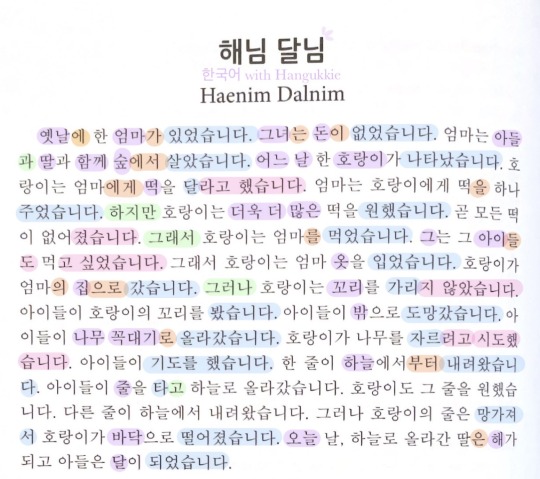
English Translation:
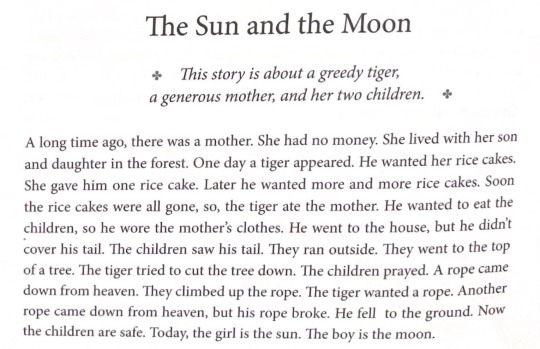
———————————————————
Vocabulary:
옛날 - Olden days
옛날에 - Once upon a time
어머니/엄마 - Mum
그녀 - She/Her
돈 - Money
아들 - Son
딸 - Daughter
함께 - Together
숲 - Forest
어느 - Which
날 - Day
호랑이 - Tiger
떡 - Rice cake
더욱 더 - More and more
많이/많은 - Many/A lot
그 - He/Him
아이 - Kid/Child
아이들 - Kids/Children
옷 - Clothes
집 - House
꼬리 - Tail
밖 - Outside
나무 - Tree
꼭대기 - The top
하늘 - Sky
줄 - Rope
바닥 - Floor
오늘 - Today
해 - Sun
달 - Moon
Grammar - Verbs:
있다 - To exist
없다 - To not exist
살다 - To live
나타나다 - To appear
달다 - To ask/To request (In this context)
주다 - To give
원하다 - To want/To wish/To desire
먹다 - To eat
가다 - To go
가리다 - To cover
보다 - To see
도망가다 - To run away
올라가다 - To go up
자르다 - To cut
기도를 하다 - To pray
내리다 - To get off
떨어지다 - To fall
된다 - To become
Grammar - Sentence Forms:
라고 하다 - For indirect quotations
지다 - To become
도 - Too/Also/As well as
고 싶다 - To want
지 않다 - Is not
려고 - To intend to
시도하다 - To attempt to
Grammar - Connectives:
과 - And/With (With 받침)
하지만 - But
그래서 - So
그러나 - But/However
하고 (고) - And/With
Grammar - Markers/Particles:
에 - To/At (Location and time marker)
가 - Subject particle
는 - Topic particle
이 - Subject particle (With 받침)
에서 - At/In/On/From (Location marker)
에게 - To/For
을 - Object particle (With 받침)
를 - Object particle
들 - Plural marker
의 - Possessive marker
으로 - By/As/For/To/Towards/With (Directional marker)
로 - By/As/For/To/With (Directional marker - with 받침)
부터 - From/Since (Location and time marker)
은 - Topic particle (With 받침)
#korean language#korean langblr#korean#langblr#korean study blog#korean studyblr#study blog#studyblr#korea#korean vocab#korean vocabulary#korean vocab list#Korean stories#Korean fairytales#Korean folktales#korean folklore#한국#한국어#한국어 공부#한국어 읽기#한국어 어휘#한국어 단어#한국어 문법#공부#읽기#어휘#단어#문법#한국 전래동화#전래동화
464 notes
·
View notes
Text

이 선을 넘지마시오 please do not cross this line • 이 this • 선 line • -을/를 object marking particle • 넘다 exceed, go beyond, cross • -지 말다 negative imperative, don’t • -ㅂ시오/-으십시오 imperative sentence ending (formal)
38 notes
·
View notes
Text
Korean Prepositions

위: on/above 안: in 속: inside, among
밖: outside 밑: under/beneath 아래: under/beneath 앞: in front 뒤: behind
왼쪽: left 오른쪽: right
건너편: across from
사이: between 가운데:in the middle 옆: next to 근처: near
한국어 교과서는 책상 위에 있어요: The Korean textbook is on the desk 그의 강아지는 소파 아래에 있어요: His puppy is under the sofa 고양이는 제 서랍 안에 숨어 있었어요: The cat was hiding in my drawer
#korean#korean langblr#korean studyblr#langblr#studyblr#grammar#korean vocab#mine#vocab#korean grammar
52 notes
·
View notes
Text
Semester in SK: Korean Curse Words
안녕하세요 여러분! I’m sharing yet another Instagram post with you all--this one is about a bunch of Korean curse words! Very silly, I know, but curse words are a big part of any language and can be fun to learn about! Of course, be careful when using these and please do not use them often--I’m just sharing them for fun and so you can recognize them if you hear them :) I hope you enjoy! 화이팅!

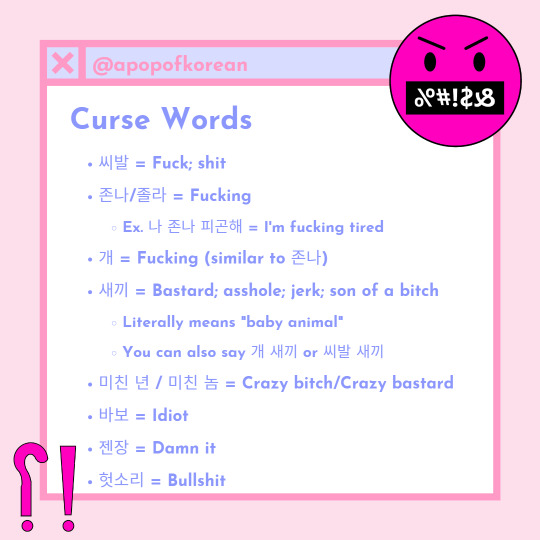
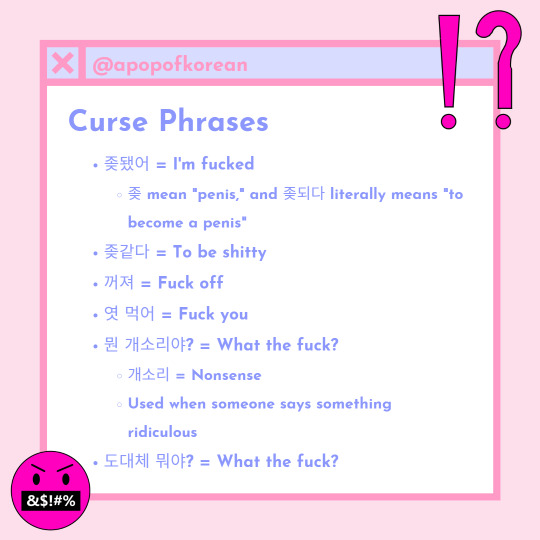
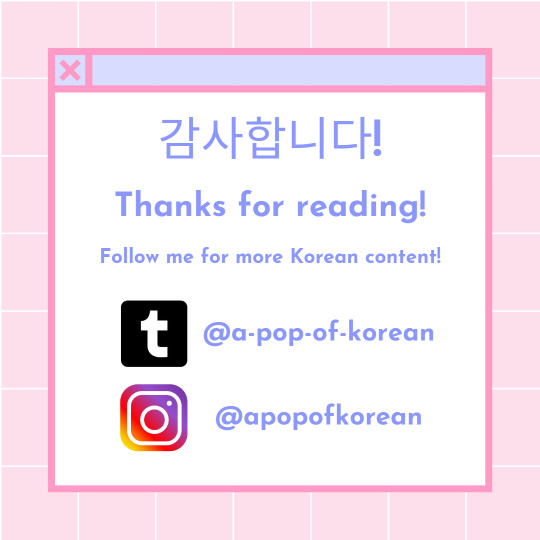
My masterlist
Join my Discord chat here to practice Korean with others!
Follow me on Instagram here for more Korean content!
Get Drops Premium using my affiliate link to expand your Korean vocab!
Check out my Ko-Fi to support this blog and my studies! Thank you for your generosity!
#korean#korean language#korean vocabulary#korean vocab#study abroad#learn korean#learning korean#study korean#studying korean#korean culture#유학#유학생활#한국#한국 문화#어휘#한국어#한국어 공부하기#한국어 배우기#langblr#korean langblr
479 notes
·
View notes
Text
some more words related through Hanja characters:
If you don't know what Hanja is, it refers to the Chinese-derived words of the Korean language. Pretty much half of Korean comes from originally Chinese words (and therefore will share pronunciation similarities with actual Chinese) and the rest is pure Korean.
Just like Latin and Greek is to English (e.g. aqua- hydro- indicate relation to 'water'), we can remember some Hanja to make semantic links between words in Korean.
The majority of Korean people's names have Hanja equivalents and could be written out in Chinese (sometimes required on official documents) and will be chosen by their parents based on the traditional semantic meaning. However, in the last few decades more Korean people are giving their kids pure Korean names with nice meanings such as 사랑, 보라, 하나, 하늘, 진주. More on Korean names in a future post!
Anyway, on with some semantic Hanja word links.
Marriage related words - 혼
결혼 - marriage
이혼 - divorce
약혼 - engagement (does the 약 part also seem familiar? It's the same 약 in 약속 - promise, and 예약 - appointment.)
기혼 - married (as in the person's status)
미혼 - unmarried, single
water related words - 수
수달 - otter
생수 - drinking/fresh water
수상 스키 - water ski (상 is a Hanja meaning 'above')
홍수 - flood
호수 - lake
school related words - 학 and 교
학교 - school
학생 - student
교복 - school uniform (your probably know what Hanbok is right? 한 - Korea 복 - clothing. That's the same 복.)
교육 - education
middle related words - 중
중국 - China (국 is the character used in country names)
중학교 - middle school
중급 - middle/intermediate level
중 - medium size (might see on a menu with portion options)
beauty related words - 미
미국 - the U.S.
미녀 - beautiful woman
미용실 - beauty salon/hairdressers
people related words - 인
인간 - human
~인 - person from ~ country (a Korean, a Brit, a German etc)
인생 - life
인기 - popularity
인사 - greeting
인삼 - ginseng (so called because the root resembles a person)
개인 - personal, private
주인 - owner
부인 - wife
female related words - 여/녀
여신 - goddess
미녀 - beautiful woman
마녀 - witch
그녀 - she
여성 - female
소녀 - girl (소 is another Hanja meaning small)
#cannot think of anymore rn its 10pm lol#korean study#korean learning#korean grammar#langblr#korean langblr#korean studyblr#korean vocab#hanja
29 notes
·
View notes
Text
한자어 - 적/的
적(的). affix. '과녁'이나 '목표', '분명하다'라는 뜻을 가진 글자이다. (a letter with the meaning of 'target' or 'aim, goal', 'clear, distinct'.)
the suffix -적 is used to turn nouns into adjectives or adverbs, for example:
대화적 - oral, conversational, dialogic
세계적 - global
일반적 - common, regular
정신적 - mental(ly)
남성적 - masculine
the suffix 적 is often used in combination with the copula -이다 to form an adnominal -인, or with the instrumentative particle -으로 to form an adverb of manner, for example: 정신적으로 힘들다 (to be hard mentally), 남성적인 여자 (masculine woman)
#한국어#korean#korean studyblr#korean langblr#langblr#langvillage#한국어 공부#한국어 배우기#한국어 공부하기#한자#한자어#漢字#study korean#한국말#korean vocab#korean language#learning languages#foreign languages#language learning#languages
29 notes
·
View notes
Text
익숙하다 - to get used to
결국 - in the end, finally
취업하다 - to get a job
국내 - the interior of a country
제품 - a manufactured product/s or good/s
비교 - comparison
인정 - acknowledgement, approval
영향 - influence, effect
서로 - mutually, each other
안부 - well-being, tidings
솟아오르다 - to soar (upwards), fly up
52 notes
·
View notes
Text
Korean Slang [UPDATED]
I logged into tumblr for the first time in like YEARS and found out that I promised an updated Korean slang post 2 years ago😅
갓생��(gat-saeng) ➡️ "that girl" lifestyle, someone who's productive
고인물 (go-in-mul) ➡️ someone who's played a game for a long time
꾸안꾸 (kku-an-kku)➡️ no-makeup makeup
누물보(nu-mul-bo)➡️ "who asked?"
띵언 (dding-eon)➡️ a good quote
머선129 (meo-sun-il-e-gu) ➡️ what's going on
무물보 (mu-mul-bo)➡️ ask me anything
반모(ban-mo)➡️ banmal mode (not use honorifics)
성덕(sung-deok)➡️ successful fan (a fan whose met their idol)
식집사 (sik-jip-sa)➡️ plant mom/dad
스불재(seu-bul-je)➡️ self-inflicted disaster
알잘딱깔센(al-jal-ttak-kkal-sen)➡️ doing something well/perfectly on your own
어쩔티비 (eo-jjeol-tee-bi)➡️ "what are you gonna do"
억텐 (eok-ten)➡️ (I have a lot to say but I won’t say it)
워라벨(wo-la-bell) ➡️ work life balance
자만추 (ja-man-chu)➡️ (hurts my heart)
케바케 (ke-ba-ke)➡️ case by case
아아 (ah-ah)➡️ ice americano
주불(ju-bul)➡️ tell me your address
킹받네(king-bat-ne)➡️ something/someone is annoying
#korea#korean#learn korean#korean vocab#korean words#korean word of the day#korean vocab list#korean slang#langblr#languageblr
493 notes
·
View notes
Text
There’s a word in Korean: 인연 [in yun] — it means “providence” or “fate”. If two strangers walk by each other in the street, and their clothes accidentally brush, that means there have been eight thousand layers of 인연 between them
35 notes
·
View notes
Text
Vocabulary 직업
직업 - occupations
가수 - singer
간호사 - nurse
경찰 - police officer
공무원 - government employee
과학자 - scientist
교수 - professor
군인 - military personnel
기술자 - technician
기자 - reporter, newspaperman
농부 - farmer
님 - sir, ma’am (honorific form)
배우 - actor, actress
변호사 - lawyer
비서 - secretary
승무원 - flight attendant, crew
우체부 - mail carrier, postman
은행원 - bank employee
의사 - doctor
주부 - housewife
직업 - job, occupation
화가 - artist, painter
#korean#korean vocabulary#vocabulary#korean vocab#south korea#south korean#korea#language#language learning#korean language#korean langblr#langblr#study#korean studyblr#studyblr#learning#learn#studying#tesol#tesl#tefl#korean culture#teaching
18 notes
·
View notes
Text
쫓다 vs 좇다-
Sometimes even Koreans make mistakes of using 쫓다 in places of 좇다, but there are differences! Read more to find out the difference between these two similar words :)




Basically,
🔸️쫓다 - To rush after something in order to catch or meet an object - 쫓다 is chasing something physical - Used with words like 술래(tagger), 추격전(chase), 사냥꾼(hunter)
🔸️좇다 - To pursue goals, ideals, happiness, etc. - 좇다 is chasing something abstract - Used with words like 목표(goal), 이상(ideal), 명예(honor), 행복(happiness)
Try out the quiz! click the read more to see the answers to the quiz :) As always, here's a link to our instagram post. We upload first on instagram, so if you want the latest posts from us, consider following us on instagram as well :)
Answers:
축구 선수가 축구공을 쫓는다. (The soccer player chases after the soccer ball.) 그는 꿈을 좇아 열심히 연습하는 배우이다. (He is an actor who practices hard chasing his dream.)
#study korean#learn korean#korean vocab#korean#한국어 공부#한국어 배우기#한국어#hangul#language#langblr#Korean langblr#한국어 공부하기#Korean language
33 notes
·
View notes
Text
Hi guys! It’s been a VERY long time since I last posted but I return with some exciting news !!
I sent in my EPIK application today!! I’ve finally applied to teach abroad in Korea !
15 year old me would be in disbelief that I’ve finally made the plunge! It honestly just feels surreal.
I’m gonna post updates about my journey as it unfolds!! Please stay tuned ☺️
#korean language#korean langblr#korean#langblr#korean study blog#korean vocab#study#korean vocabulary#EPIK#teaching in korea#TEFL
10 notes
·
View notes
Text

문이 열리지 않으면 사용중이므로 잠시만 기다려 주세요 in use if the door isn't open, please wait a moment • 문 door • -이/가 subject marking particle • 열다 open • -이/히/리/기 passive voice, usage is determined by word’s 받침 • -지 않다 to not be • -(으)면 if • 사용중 in use (사용 use, usage, 중 in the middle of) • -이므로 because, since (formal, typically used in written instances) • 잠시만 just a moment • 기다리다 wait • -아/어/여 주세요 please do (for me) (주다 to give)
18 notes
·
View notes
Text
놀고 먹다

놀다: to play/hangout 먹다: to eat
놀다 + 먹다 combined together means “to live idly/without purpose”. Living an easy comfortable life without a job or work, just playing and eating your life away haha
그냥 놀고 먹고 싶어요: I want to just live idly
11 notes
·
View notes
Text
Hanja Lesson: 후
안녕하세요 여러분! This week's lesson is a Hanja one, this time a little but about 후! You can find this lesson on my Instagram here as well. I hope it's helpful :) Let's start!

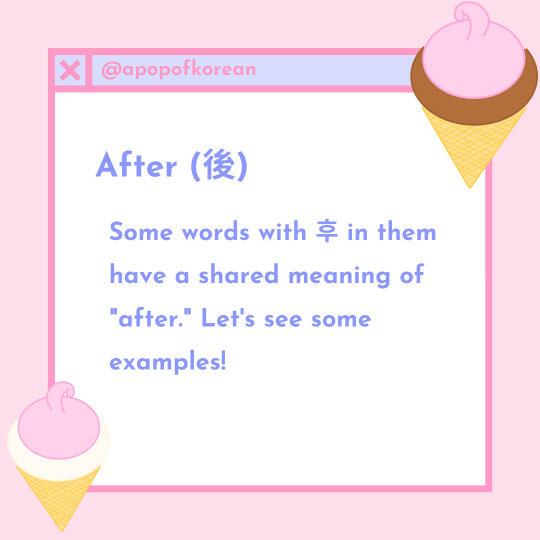


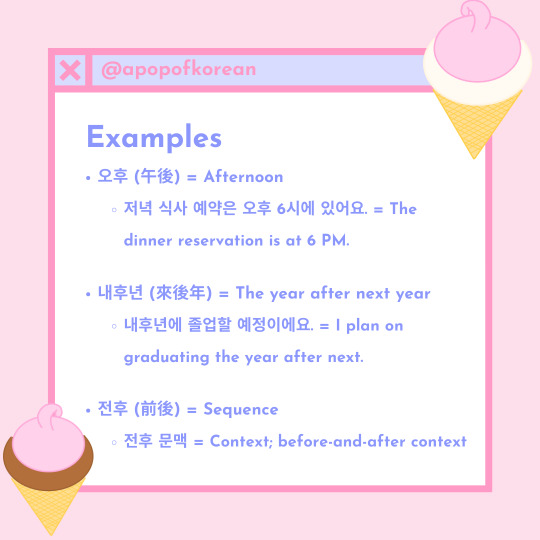

My masterlist
Join my Discord chat here to practice Korean with others!
Follow me on Instagram here for more Korean content!
Check out my Ko-Fi to support this blog and my studies! Thank you for your generosity!
#korean#korean language#langblr#korean langblr#study korean#studying korean#learn korean#learning korean#apok#korean vocab#korean vocabulary#hanja#hangul#한국어#��글#한자#한국어 배우기#한국어 공부하기#어휘#단어
100 notes
·
View notes